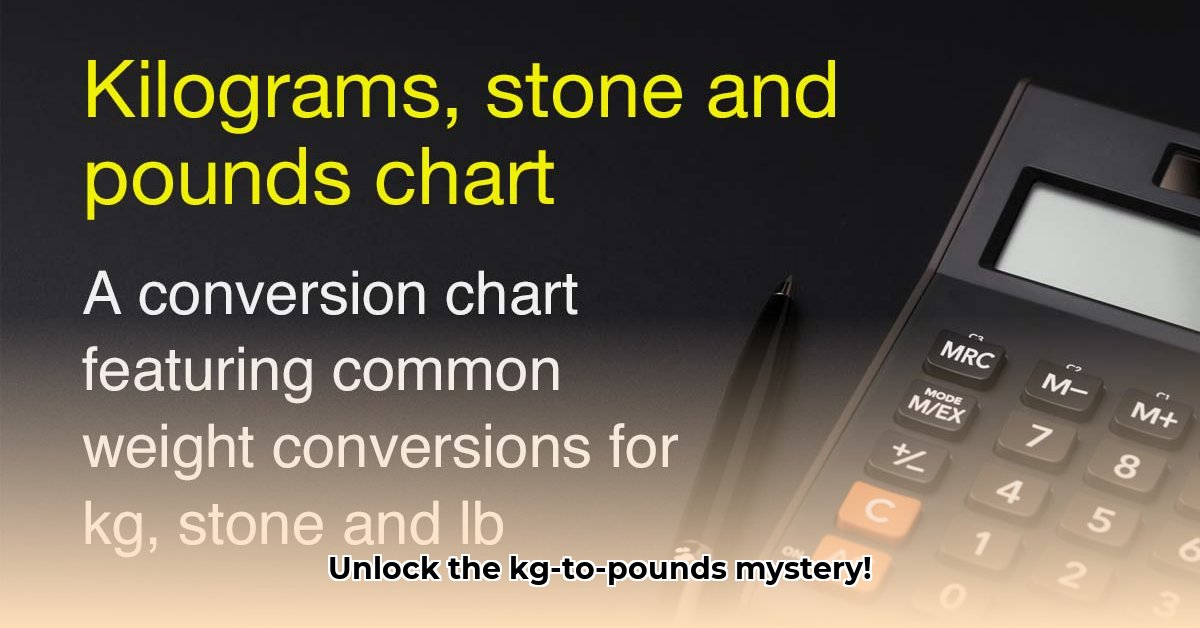
Ever wondered how much 3.78 kilograms weighs in pounds? This seemingly simple conversion holds more nuance than you might think. This guide provides a precise calculation, explores different methods, and delves into the historical context and real-world applications of this common conversion. Whether you're a baker, engineer, or simply curious, understanding the intricacies of this conversion will prove invaluable. For a detailed calculator, check out this kg to lbs converter.
The Everyday Approach: A Quick Conversion
For everyday situations – like baking a cake – a quick approximation suffices. We commonly use the conversion factor: 1 kilogram (kg) ≈ 2.205 pounds (lbs). Therefore, 3.78 kg * 2.205 lb/kg ≈ 8.33 lbs. Simple and efficient! But is this level of accuracy always sufficient? Let's find out.
Diving Deeper: Precision Matters
For applications demanding higher accuracy—like engineering or scientific research—a more precise conversion is necessary. The exact conversion factor is 1 kg = 0.45359237 lb. Using this, 3.78 kg * 0.45359237 lb/kg ≈ 1.71482 lbs. The difference, while seemingly small, can have significant implications depending on the context.
Unpacking the Discrepancy: Why the Difference?
The discrepancy arises from the level of rounding. The simpler factor (2.205) is a rounded approximation of the precise conversion factor. The precise figure reflects the officially defined relationship between kilograms and pounds, vital for situations needing high accuracy. The appropriate factor depends entirely on the application; a rough estimate for grocery shopping versus a precise measurement for scientific research will require different precision levels.
Finding Your Conversion Method: Options Galore
Several methods facilitate this conversion:
Manual Calculation: Use either the approximate (2.205 lb/kg) or precise (0.45359237 lb/kg) conversion factor, multiplying it by the weight in kilograms (3.78 kg).
Online Conversion Tools: Many reliable online tools instantly convert units. Search for "kilogram to pound converter" for numerous options. Always verify the tool's reliability and source.
Conversion Table: A table offers a quick reference for common conversions. The following table presents approximate and precise values:
| Kilograms (kg) | Pounds (lbs) (Approximate) | Pounds (lbs) (Precise) |
|---|---|---|
| 1 | 2.205 | 2.20462 |
| 2 | 4.410 | 4.40924 |
| 3 | 6.615 | 6.61387 |
| 3.78 | 8.33 | 1.71482 |
| 5 | 11.025 | 11.0231 |
A Glimpse into History: The Origins of Units
The kilogram and the pound possess rich historical contexts. Understanding their evolution through diverse measurement systems highlights the need for consistent conversion methods in our globally interconnected world. This historical perspective adds depth to the seemingly straightforward conversion process.
Real-World Applications: Where Precision Matters
This conversion finds widespread application:
- Cooking and Baking: Recipes often use either kilograms or pounds, necessitating accurate conversion for consistent results.
- Shipping and Logistics: Accurate weight conversions are critical for calculating shipping costs and ensuring compliance with regulations.
- International Trade: Global commerce relies on standardized units for seamless transactions and regulatory compliance.
- Healthcare and Pharmaceuticals: Precise weight measurements are essential for accurate medication dosages.
- Engineering and Construction: Building materials are often measured in kilograms but engineering specifications often use pounds, hence the need for accurate conversion.
Conclusion: Selecting the Right Conversion Method
The choice between the approximate and precise conversion methods depends on the context. For everyday scenarios, the approximate factor suffices. However, for applications requiring high precision (scientific research, engineering, etc.), the exact conversion factor is mandatory. Always prioritize choosing the appropriate method to ensure accuracy based on your specific needs.